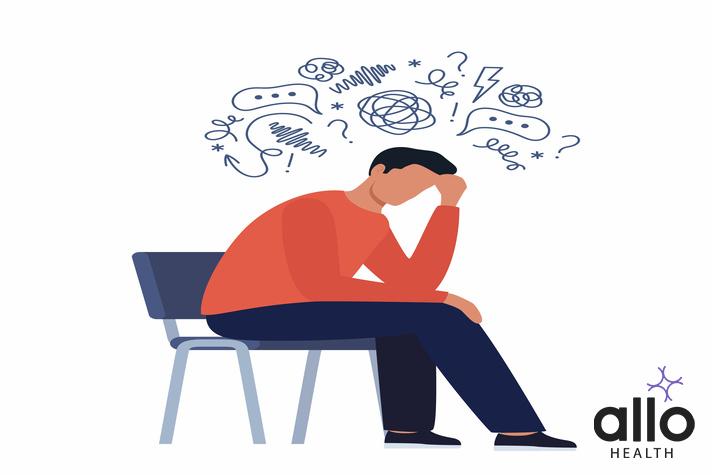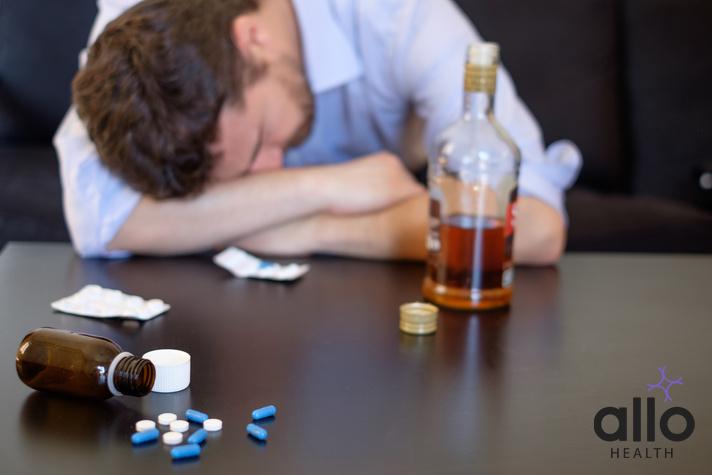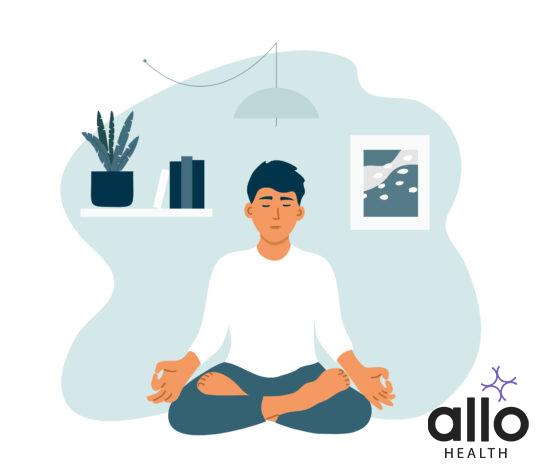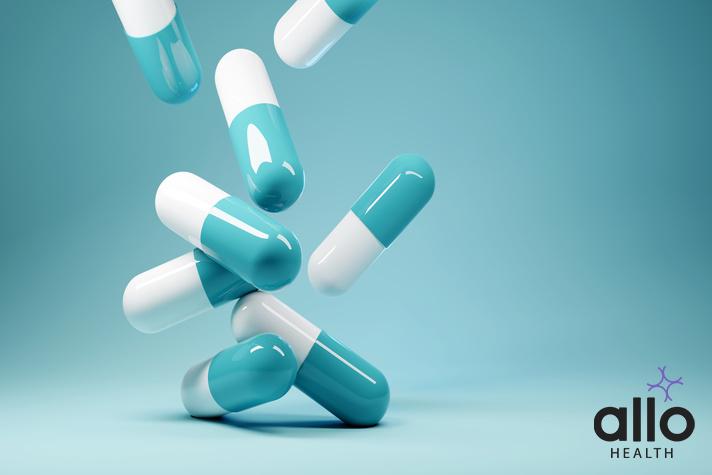Diazepam and its Impact on Erectile Function

Allo Health is dedicated to personalized well-being, offering support and trusted information tailored to individual health goals. The platform emphasizes human-generated content, led by a distinguished medical team of experts, including physicians and sexual health specialists. Their commitment to credibility involves rigorous fact-checking, authoritative research, and continuous updates to ensure accurate, up-to-date information. Allo Health's unique approach goes beyond conventional platforms, providing expert-led insights and a continuous commitment to excellence, with user feedback playing a crucial role in shaping the platform's authoritative voice.

Dr.Sushma.V completed MBBS degree from BGS GIMS,bangalore
Why This Was Upated?
Our experts continually monitor the health and wellness space, and we update our articles when new information became available.
Updated on 13 April, 2024
- Article was updated as part of our commitment to diversity, equity, and inclusion.

"The following blog article may discuss medical treatments and interventions. However, it is important to note that the information provided is for general educational purposes only and should not be considered as a substitute for professional medical advice, diagnosis, or treatment. Always seek the guidance of a qualified healthcare professional for personalized medical advice.
Book consultation
Medical treatments are complex and should be tailored to individual circumstances. The information presented in this blog may not be applicable to everyone, as each person's medical condition, history, and needs are unique. Only a qualified healthcare professional can evaluate your specific medical situation, consider relevant factors, and provide appropriate recommendations for diagnosis, treatment options, and monitoring.
It is crucial to note that self-diagnosis, self-medication, or relying solely on the information provided in this blog for treatment decisions can have serious health consequences. "
Do you struggle with anxiety, panic attacks or muscle spasms? If so, you may be taking Diazepam, a drug that is commonly known as Valium. Diazepam is a medication that can help relieve anxiety, muscle spasms and seizures. However, did you know that there is a link between Diazepam usage and erectile dysfunction? In this article, we will explore the link between Diazepam and erectile dysfunction in depth, understanding how Diazepam affects sexual health, and considering alternatives to this medication for anxiety relief.
Understanding Diazepam and Its Uses
Diazepam, a benzodiazepine medication renowned for its impact on the central nervous system, plays a crucial role in managing various conditions. Here’s a closer look at its uses, mechanisms, precautions, and considerations:
Uses of Diazepam:
- Anxiety: Diazepam is frequently prescribed to alleviate symptoms of anxiety. By enhancing the activity of GABA, it helps regulate neural excitability, promoting a calming effect.
- Muscle Spasms: Its muscle relaxant properties make diazepam effective in treating muscle spasms, providing relief to individuals experiencing involuntary contractions.
- Seizures: Diazepam serves as an anticonvulsant, aiding in the management of seizures by stabilizing neural activity.
Administration Methods:
Diazepam is versatile in its administration:
- Oral: Commonly prescribed in pill form, oral administration is convenient for daily usage.
- Injection: In some cases, healthcare professionals may administer diazepam through injections for faster effects.
- Rectal: For situations where oral or injection methods are impractical, rectal administration provides an alternative route.
Mechanism of Action:
- Diazepam’s mechanism lies in enhancing the activity of GABA, an inhibitory neurotransmitter. By doing so, it mitigates excessive neural activity in the brain, fostering a state of relaxation and sedation.
Precautions and Considerations:
- Habit-Forming Nature: Caution should be exercised due to diazepam’s potential for habit formation. Patients must strictly adhere to the prescribed dosage and duration under the guidance of a healthcare professional.
- Withdrawal Symptoms: Abrupt discontinuation can lead to withdrawal symptoms, ranging from seizures and tremors to heightened anxiety. Tapering off the medication under medical supervision is crucial.
- Avoiding Drowsiness Risks: Combining diazepam with alcohol or other medications causing drowsiness heightens the risk of adverse effects. Patients should be vigilant about potential interactions.
Long-Term Use Considerations:
- Tolerance Development: Prolonged diazepam use can lead to tolerance, necessitating higher doses for the same therapeutic effect. This escalation heightens the risk of side effects and dependency.
- Caution in Alcohol Use: Long-term usage raises concerns about potential interactions with alcohol, emphasizing the need for healthcare professionals to monitor patients closely.
Consultation with Healthcare Professionals:
- Discussion of Concerns: Patients are encouraged to openly discuss any apprehensions or questions regarding diazepam with their healthcare providers.
- Regular Check-Ins: Periodic check-ins with healthcare professionals allow for the assessment of the medication’s efficacy, potential side effects and adjustments to the treatment plan if needed.
Additional Considerations:
- Individualized Approach: Recognizing that individual responses vary, healthcare providers tailor diazepam treatment plans to the unique needs and conditions of each patient.
- Holistic Patient Care: Beyond medication, healthcare professionals may explore complementary approaches, including therapy and lifestyle adjustments, to optimize overall well-being

What Is Erectile Dysfunction and How Common Is It?
Erectile dysfunction (ED) is a condition impacting a man’s ability to sustain an erection during sexual activity, potentially affecting men of all ages. Its emotional toll is significant, influencing self-esteem, relationships, and overall quality of life. Multiple factors contribute to ED, encompassing physical conditions like diabetes, high blood pressure, and heart disease, as well as lifestyle choices such as smoking, excessive alcohol intake and obesity. Medications and psychological factors like stress, anxiety and depression also play a role. Seeking guidance from a healthcare provider is crucial for diagnosis, understanding underlying causes and exploring suitable treatment options.
The Causes of Erectile Dysfunction
Erectile dysfunction, a prevalent condition affecting men, has multifaceted causes rooted in physical, psychological and lifestyle factors. Delving into these factors provides insights into the intricate nature of ED:
Physical Causes of ED:
- Hypertension (High Blood Pressure): Elevated blood pressure can impact the proper flow of blood to the penile region, hindering the process of achieving and maintaining an erection.
- High Cholesterol Levels: Excessive cholesterol can lead to the buildup of plaques in blood vessels, impeding blood flow crucial for a healthy erection.
- Diabetes: Diabetes can contribute to nerve damage and blood vessel impairment, both critical factors in erectile function.
- Heart Disease: Conditions affecting the cardiovascular system can disrupt blood flow, affecting erectile function.
- Obesity: Excess body weight is linked to hormonal imbalances and vascular issues, both factors contributing to ED.
- Hormonal Imbalances: Disruptions in hormone levels, including testosterone, can impact sexual function.
Psychological Causes of ED:
- Anxiety: High levels of anxiety, whether related to performance or general life stressors, can interfere with the mental state necessary for a successful erection.
- Depression: Mental health conditions, such as depression, can adversely affect libido and overall sexual function.
- Relationship Difficulties: Strained relationships or unresolved issues within partnerships can manifest as ED.
- Stress: Persistent stress, whether work-related or personal, can contribute to the development of erectile difficulties.
Lifestyle Factors Contributing to ED:
- Smoking: Tobacco use is a significant risk factor, as smoking can impair blood vessel function and decrease overall cardiovascular health.
- Excessive Alcohol Consumption or Drug Use: Substance abuse can impact the nervous system and blood flow, leading to erectile issues.
- Lack of Exercise: Sedentary lifestyles contribute to obesity and poor cardiovascular health, both linked to ED.
Other Physical Causes:
- Injury or Damage: Trauma to the pelvic area or surgical interventions, such as prostate surgery, can result in nerve or blood vessel damage, affecting erectile function.
- Medication Side Effects: Certain medications, including those prescribed for hypertension or depression, may have ED as a side effect.
Symptom of Underlying Medical Conditions:
- Atherosclerosis: The buildup of plaque in arteries can affect blood flow, potentially leading to ED.
- Multiple Sclerosis: Neurological conditions, such as multiple sclerosis, can impact nerve signals crucial for achieving and maintaining an erection.
Importance of Seeking Medical Attention:
Persistent erectile dysfunction can be a symptom of underlying health issues. Seeking timely medical attention is crucial for:
- Early Diagnosis: Identifying and addressing potential causes promptly.
- Tailored Treatment Plans: Developing interventions based on the specific factors contributing to ED.
- Preventing Complications: Addressing underlying conditions to prevent further health complications.
How Does Diazepam Affect Erectile Function?
Diazepam, a benzodiazepine medication, has been associated with sexual dysfunction, particularly erectile dysfunction (ED). Exploring the mechanisms and potential effects on sexual health is crucial for those prescribed this medication:
Mechanisms Leading to Sexual Dysfunction:
- Impaired Erection Creation: Benzodiazepines, including Diazepam, may interfere with the body’s natural ability to create an erection. This is attributed to the impact on neurotransmitters and receptors involved in the complex process of achieving and sustaining an erection.
- Hormonal Impact: Diazepam use has been linked to a decrease in testosterone and other sex hormones. This hormonal imbalance can contribute to a diminished libido and increase the likelihood of experiencing ED.
Individual Variability in Sexual Side Effects:
- Age: Age can influence the susceptibility to sexual side effects. Older individuals may be more vulnerable due to age-related changes in hormone levels and overall health.
- Overall Health: The general health of an individual plays a role. Those with pre-existing conditions or compromised health may be more susceptible to sexual dysfunction.
- Dosage: The dosage of Diazepam is a critical factor. Higher doses may intensify the risk of sexual side effects, emphasizing the importance of an individualized treatment plan.
Consultation with Healthcare Providers:
- Open Communication: Patients taking Diazepam are encouraged to communicate openly with their healthcare providers about any sexual dysfunction experienced.
- Dosage Adjustment: Healthcare providers can consider adjusting the dosage or exploring alternative treatments to address sexual side effects while ensuring the continued management of anxiety or related conditions.
Additional Side Effects and Safety Considerations:
- Drowsiness: Diazepam use is associated with drowsiness. Individuals are advised to avoid tasks requiring focus, such as driving or operating machinery, to prevent accidents.
- Dizziness: Dizziness is a common side effect. Caution is advised when standing up or moving quickly to prevent falls or injuries.
- Confusion: Some users may experience confusion, highlighting the need for heightened awareness and immediate medical attention if severe or persistent.
Safety Precautions:
- Avoiding Hazardous Activities: Individuals taking Diazepam should refrain from engaging in activities that demand alertness and coordination due to the risk of impaired cognitive function.
- Monitoring Side Effects: Regular self-monitoring for side effects, especially those affecting cognitive and motor functions, is crucial for maintaining personal safety.
Seeking Immediate Medical Attention:
- Severe Side Effects: In the presence of severe or concerning side effects, such as profound drowsiness or confusion, seeking prompt medical attention is paramount.
- Professional Guidance: Consulting healthcare providers ensures timely intervention and appropriate adjustments to the treatment plan.

Alternatives to Diazepam for Anxiety Treatment
Exploring various alternatives to Diazepam for anxiety treatment involves considering a range of options, including medications, psychological therapies and natural remedies. Here are some alternatives and coping mechanisms to manage anxiety effectively:
Medication Alternatives:
- Buspirone: An anti-anxiety drugs with a lower risk of sexual dysfunction compared to Diazepam.
Psychological Therapies:
- Cognitive-Behavioral Therapy (CBT): A structured therapy that helps identify and modify negative thought patterns contributing to anxiety. Can be conducted individually or in group settings with a licensed therapist.
- Mindfulness-Based Stress Reduction (MBSR): A therapeutic approach incorporating mindfulness meditation and awareness to manage stress and anxiety.
Natural Remedies:
- Herbal Supplements: Chamomile, lavender, and passionflower are herbs known for their calming effects on the body. Consultation with a healthcare professional is recommended before incorporating herbal supplements.
- Aromatherapy: Involves the use of essential oils to promote relaxation and reduce stress levels. Scents like lavender, chamomile, and bergamot are commonly used for their calming properties.
Lifestyle Changes:
- Exercise: Regular physical activity, such as yoga or aerobic exercise, can help reduce anxiety. Promotes the release of endorphins, the body’s natural stress relievers.
- Healthy Diet: Maintaining a balanced and nutritious diet contributes to overall well-being. Limiting caffeine and sugar intake may help stabilize mood.
- Sleep Pattern: Establishing a consistent sleep routine is crucial for mental health. Quality sleep plays a significant role in managing anxiety.
Coping Mechanisms:
- Stress-Reducing Techniques: Meditation and deep breathing exercises help calm the mind and reduce anxiety. Incorporating mindfulness practices into daily routines.
- Social Support: Seeking support from friends or family members can provide emotional assistance. Sharing concerns and feelings with trusted individuals.
- Self-Care Activities: Engaging in activities that bring joy and relaxation, such as hobbies or leisure pursuits. Prioritizing self-care fosters a positive mindset.
Professional Guidance:
- Consultation with Healthcare Providers: Before initiating any new treatment or supplement, consulting with a healthcare professional is essential. Professionals can offer personalized advice based on individual health and needs.
- Therapist-led Alternative Therapies: Alternative therapies like acupuncture or massage, when guided by a licensed therapist, may complement anxiety management. Ensure discussion with healthcare providers to address potential interactions or side effects.

Tips for Managing Anxiety Without Diazepam
Stress-Reducing Techniques:
- Meditation: Practice mindfulness meditation to cultivate a calm and focused mind.
- Deep Breathing Exercises: Incorporate deep breathing techniques to promote relaxation and alleviate tension.
- Yoga: Engage in yoga for its combination of physical postures, breath control and meditation.
- Exercise: Regular physical activity, such as aerobic exercise, contributes to stress reduction.
Lifestyle Factors:
- Healthy Diet: Maintain a balanced diet rich in nutrients to support overall well-being. Limit intake of caffeine and sugar, as they can contribute to anxiety.
- Quality Sleep: Establish a consistent sleep pattern for improved mental health and stress management.
Social and Emotional Support:
- Seek Support: Reach out to friends or family members for emotional support during challenging times.
- Self-Care Activities: Engage in activities that bring joy and relaxation, fostering emotional well-being.
Therapeutic Approaches:
- Cognitive-Behavioral Therapy (CBT): Identify and modify negative thought patterns contributing to anxiety. Can be conducted individually or in group settings with a licensed therapist.
Alternative Therapies:
- Acupuncture: Explore acupuncture as an alternative therapy to alleviate anxiety symptoms. Consult with a healthcare provider to ensure compatibility with other treatments.
- Massage: Consider massage therapy for its potential to reduce muscle tension and promote relaxation. Ensure communication with healthcare providers regarding ongoing treatments.
- Aromatherapy: Use essential oils for aromatherapy to create a calming environment. Discuss choices with a healthcare provider to address potential interactions.
Professional Guidance:
- Consult with Healthcare Providers: Before trying alternative therapies, consult with healthcare providers for personalized advice. Ensure compatibility with existing medications and treatments.

Seeking Professional Help for Anxiety and Related Issues
If you are struggling with anxiety, it is essential to seek professional help from a mental health provider. A mental health professional can evaluate your symptoms, provide a diagnosis, and recommend treatment that is tailored to your needs. Mental health professionals can also provide support and guidance as you navigate the challenges of managing anxiety or related conditions.
It is important to remember that seeking professional help for anxiety is not a sign of weakness. In fact, it takes courage to acknowledge that you need help and take steps to improve your mental health. With the right treatment and support, it is possible to manage anxiety and related issues and lead a fulfilling life. Don’t hesitate to reach out to a mental health professional if you are struggling with anxiety or any other mental health concern.
Talking to Your Doctor About Erectile Dysfunction and Diazepam Usage
If experiencing erectile dysfunction (ED) or sexual dysfunction while on Diazepam, consulting your healthcare provider is crucial. They can assess symptoms, identify Diazepam’s role and suggest appropriate interventions, potentially altering medications. Notably, various drugs, including antidepressants and blood pressure medications, may cause sexual dysfunction. Disclose all medications, including supplements, to pinpoint the issue accurately. Lifestyle factors like smoking and lack of exercise can also contribute; your doctor may propose lifestyle changes alongside medication adjustments for comprehensive improvement in sexual health.
Is There a Cure for Erectile Dysfunction Caused by Diazepam?
While a complete cure for ED caused by Diazepam may not exist, various treatment options can effectively manage symptoms. Here are potential approaches:
Medical Treatments:
- Medications: Consider using medications such as Viagra to promote normal erectile functioning. Discuss with a healthcare provider to determine the most suitable option.
- Hormone Replacement Therapy: Explore hormone replacement therapy to restore normal hormonal balance. Consult with a healthcare professional to assess its suitability.
- Psychotherapy or Sex Therapy: Engage in psychotherapy or sex therapy to address the psychological and emotional impact of ED. Work closely with a qualified therapist to tailor the approach to individual needs.
Individualized Treatment Plans:
- Collaboration with Healthcare Provider: Work closely with a healthcare provider to determine the most effective treatment plan. Assess individual responses to different treatment options.
Lifestyle Changes:
- Healthy Diet and Exercise: Maintain a healthy diet and exercise routine to contribute to overall well-being. Enhance cardiovascular health, which is crucial for erectile function.
- Stress Reduction: Implement stress-reduction techniques to minimize the impact of psychological factors on ED. Practices like meditation and deep breathing can be beneficial.
- Avoidance of Alcohol and Tobacco: Reduce or eliminate alcohol and tobacco use, as they can contribute to ED. Lifestyle changes play a significant role in improving overall health.

Long-Term Effects of Diazepam Usage on Sexual Health
- Hormonal Disruption: Diazepam, a benzodiazepine, may disrupt hormonal and neurotransmitter balance, potentially leading to sexual dysfunction.
- Libido and Desire: Long-term use of Diazepam may be associated with a decrease in libido and sexual desire, raising concerns for those relying on it for anxiety management.
- Monitoring Crucial: Vigilance in monitoring changes in sexual function is crucial for individuals using Diazepam over an extended period.
- Open Communication: Open communication with healthcare providers is essential to address concerns and make informed decisions about Diazepam use and potential adjustments.
- Balancing Benefits: Individuals must carefully weigh the mental health benefits of Diazepam against potential risks of sexual dysfunction.
- Adjusting Treatment: Healthcare providers may consider adjusting Diazepam dosage or exploring alternative treatments if sexual health concerns arise.
Other Potential Side Effects of Diazepam Use
- Common Side Effects: Diazepam use may result in common side effects such as drowsiness, dizziness, fatigue, confusion and memory impairment.
- Risk of Falls: Increased risk of falls is notable, especially in elderly patients or those with conditions like osteoporosis. Monitoring for these effects is crucial.
- Respiratory Depression: Diazepam can cause respiratory depression, particularly risky for individuals with pre-existing respiratory conditions or those using other respiratory-depressant medications.
- Life-Threatening Concerns: Respiratory depression can be life-threatening, emphasizing the importance of disclosing any respiratory issues to healthcare providers before initiating Diazepam treatment.
- Physical Dependence: Long-term use of Diazepam can lead to physical dependence, making it crucial to follow healthcare provider instructions carefully to minimize the risk of withdrawal symptoms.
- Withdrawal Symptoms: Discontinuation of Diazepam may lead to withdrawal symptoms, including anxiety, insomnia, tremors, and seizures. Adherence to healthcare provider guidance is essential during this phase.
Understanding the Risks vs Benefits of Using Diazepam
Understanding the risks and benefits of Diazepam is crucial. While effective for anxiety, it may lead to side effects like ED. Collaborate with your healthcare provider to assess suitability and monitor potential side effects. Diazepam can be habit-forming, posing a risk of dependence; adhere strictly to prescribed guidelines, especially if there’s a history of substance abuse or addiction.
Conclusion: Balancing Anxiety Management with Sexual Health
Balancing anxiety management with sexual health is crucial when using Diazepam due to its potential link to erectile dysfunction (ED). While effective for anxiety, Diazepam may cause unwanted sexual side effects. Discuss concerns with a healthcare provider, exploring alternatives like psychotherapy or stress-reducing techniques. Beyond medication, anxiety can impact libido, erection and orgasm. Individualized treatment, whether through therapy, lifestyle adjustments or medication, is essential. Open communication with a healthcare provider is key to finding the right balance for overall well-being, addressing both anxiety and sexual health concerns. Consideration of alternatives ensures a personalized approach to managing anxiety and promoting sexual health.
Most Asked Questions
-
What is Diazepam, and what is it commonly prescribed for?
Diazepam, commonly known as Valium, is a benzodiazepine medication prescribed to relieve symptoms of anxiety, muscle spasms, and seizures by enhancing the activity of the inhibitory neurotransmitter GABA.
-
How does Diazepam affect sexual health, particularly erectile function?
Diazepam has been associated with sexual dysfunction, including erectile dysfunction (ED). It may interfere with the body's ability to create an erection, impact neurotransmitters and receptors, and lead to hormonal imbalances.
-
Are there alternatives to Diazepam for anxiety treatment?
Yes, alternatives include medications like buspirone, psychological therapies such as cognitive-behavioral therapy (CBT), natural remedies like herbal supplements or aromatherapy, and lifestyle changes like regular exercise and a healthy diet.
-
What are the potential side effects and safety considerations of Diazepam?
Common side effects include drowsiness, dizziness, fatigue, confusion, and memory impairment. Safety precautions include avoiding hazardous activities, monitoring for side effects, and seeking immediate medical attention for severe symptoms.
-
How can individuals manage anxiety without relying on Diazepam?
Stress-reducing techniques, lifestyle changes, therapeutic approaches like CBT, alternative therapies such as acupuncture or massage, and seeking social and emotional support are effective ways to manage anxiety without Diazepam.











































